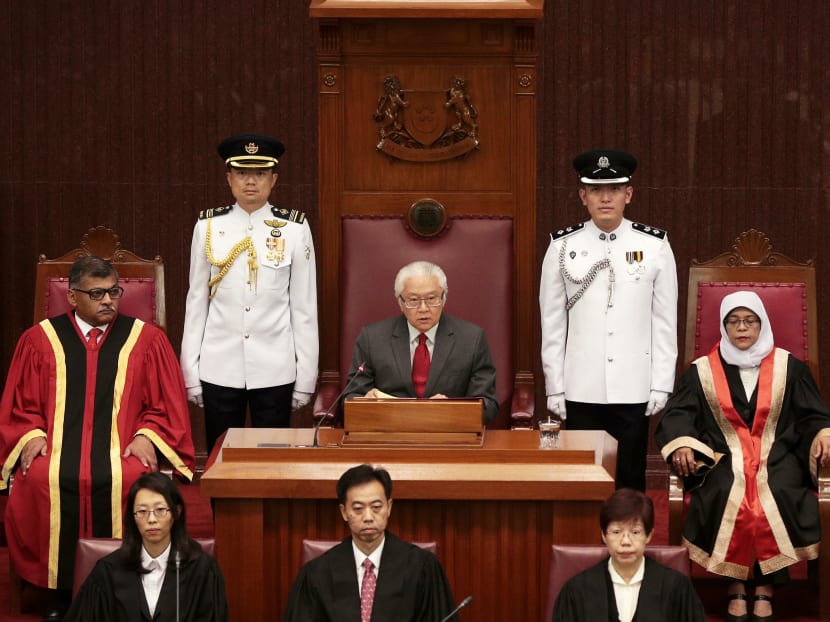Public invited to propose suitable candidates for next batch of NMPs
SINGAPORE — The public may submit the names of people they wish to see as Nominated Members of Parliament (NMPs) from now until Feb 23, with an eight-member committee led by Speaker of Parliament Halimah Yacob to then put forward the nominees for appointment by the President.

President Tony Tan speaks at the opening of the 13th Parliament of Singapore on Jan 15, 2016. Photo: Jason Quah
SINGAPORE — The public may submit the names of people they wish to see as Nominated Members of Parliament (NMPs) from now until Feb 23, with an eight-member committee led by Speaker of Parliament Halimah Yacob to then put forward the nominees for appointment by the President.
Political analysts today (Feb 2) affirmed the importance of NMPs, despite efforts by the ruling People’s Action Party and the opposition Workers’ Party to bring party members from more diverse backgrounds into the House.
Following last week’s announcement by Prime Minister Lee Hsien Loong that Non-Constituency MPs would have equal voting rights as elected MPs and the Constitution would be changed to allow up to
12 NCMPs in the House, law don and former NMP Eugene Tan said NMPs have to demonstrate that they still have an important role in Parliament.
“With more opposition MPs and Parliament consisting of only two parties, parliamentary debates will take on a more partisan complexion. Thus, the non-partisan views take on greater importance,” said Associate Professor Tan of the Singapore Management University. “It’s not that elected MPs cannot (voice non-partisan views), but there is the perception that elected MPs are speaking from and bound by a certain party line. This is more so in a politically competitive landscape.”
Aspirants with an economic or corporate background may have a slight advantage this time, since the economy is likely to dominate in the first year or two of the 13th Parliament, said Assoc Prof Tan. And while it is important for NMPs to bring their expertise to bear on matters affecting the groups they represent, they must not be seen as speaking almost exclusively for the groups, he said.
Simply based on numbers, former NMP Zulkifli Baharudin felt the NMP scheme to be less relevant — although nonetheless still so — today than in the past, when there were fewer opposition voices in the House. “As of now I think it’s relevant, because I don’t think the opposition has been elected in such a way as to have a real two-party system,” said Mr Zulkifli.
Given the recent opening of the 13th Parliament and the number of new faces, it is too early to cite specific fields that could do with more voices in Parliament as “you don’t know what type of social causes the new MPs are going to pick up”, he added.
But Institute of Policy Studies deputy research director Gillian Koh said the scheme has always been an important way “in which concerns of other parts of Singapore that do not get much focus through mainstream politics” get some airtime in Parliament. These include the environment, the arts, sports, gender equality and labour issues including those concerning migrant workers, she said.
“While those concerns are discussed elsewhere too, they should have some focus in Parliament, so it will be important that experts on and recognised leaders in the areas such as those, offer themselves to stand as NMPs and are supported to do so,” said Dr Koh.
Mdm Halimah’s special select committee, which also includes Workers’ Party chairman and Aljunied GRC MP Sylvia Lim, must nominate people who have a record of “distinguished public service”, “who have brought honour to the Republic”, or who have distinguished themselves in the field of the arts, sports, culture, the sciences, business, the professions, social service or the labour movement.
Coordinators appointed for each of seven functional groups — including National Arts Council chairman Chan Heng Chee and National Council of Social Service chief executive Sim Gim Guan — will seek views of their constituents and submit suitable names to Mdm Halimah’s committee for consideration. A person not selected by a functional group may be submitted by another proposer, and the committee will consider all applications.
Some coordinators contacted today said they would meet with Mdm Halimah this week. Theatre practitioner Kok Heng Leun, whose name was unsuccessfully put forward by the arts community during the previous NMP search, said the arts community is still finding and deciding on a candidate to be appointed as a representative. “It is up to the arts community to decide who represents them this round,” he said.
S Rajaratnam School of International Studies’ Assoc Prof Alan Chong said while pro-opposition members of society would see the NMP positions as a “compensation avenue” for the fact that the opposition did not do as well as some had expected in the previous General Election, for the ruling PAP, the NMP scheme is a continuation of a “creative exercise in parliamentary innovation”. “Nobody can say government policies are made without consultation because the NMPs will be there to provide critical (voices),” he said.






